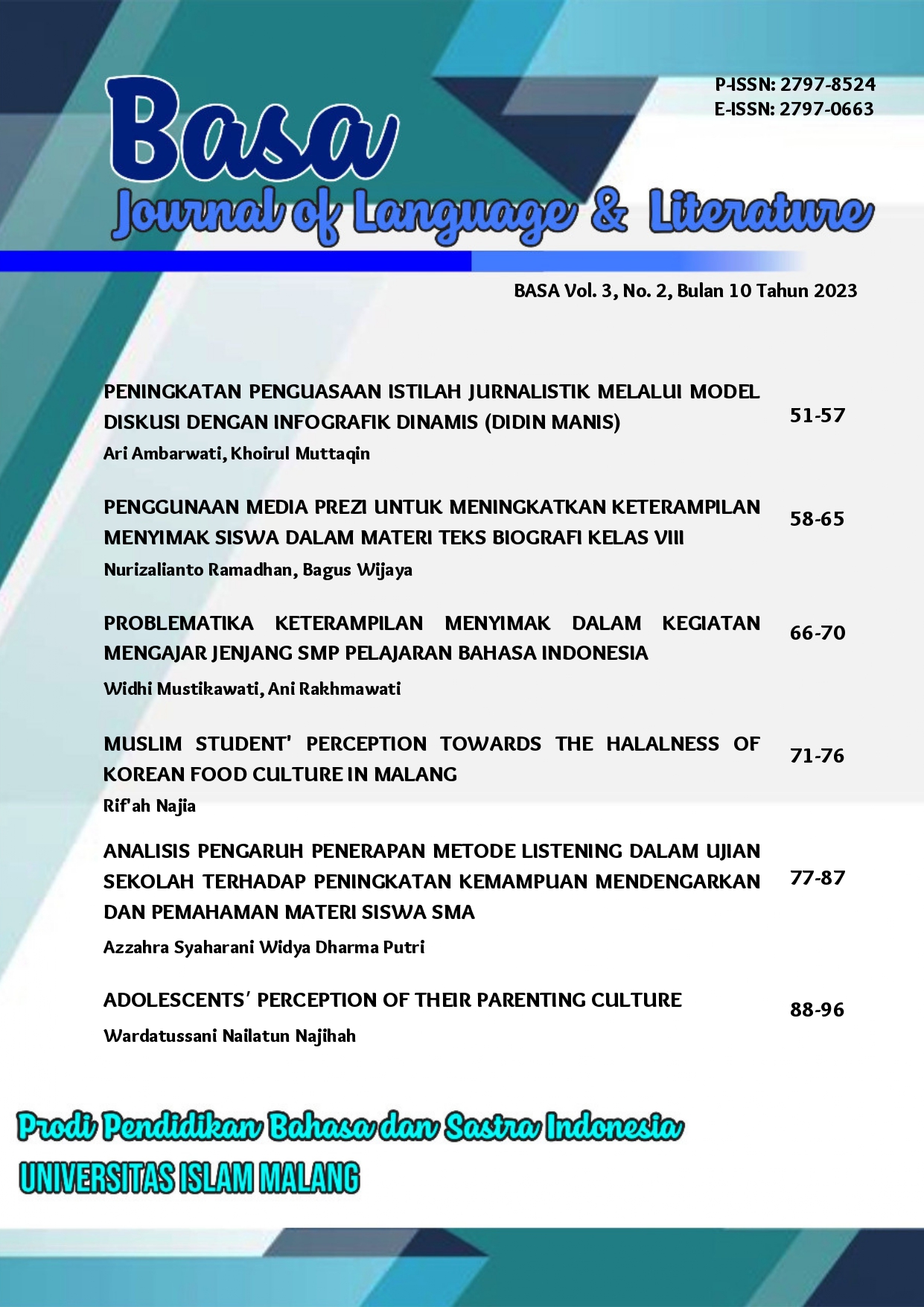MUSLIM STUDENTS’ PERCEPTION TOWARDS THE HALALNESS OF KOREAN FOOD CULTURE IN MALANG
DOI:
https://doi.org/10.33474/basa.v3i2.19980Keywords:
Korean food, Halal food, Halal Awareness, Koran CultureAbstract
The development of the Korean Wave in Indonesia has proven to have a significant influence in various sectors, including the food sector. One of the problems that arise with the development in this sector is the concern of the Indonesian Muslim community about the halalness of Korean food itself, considering that Korea (in this case South Korea) is a country whose Muslim population is only 0.2% of the total population, so it is not surprising that many foods that come from there cannot be consumed by Muslims because they contain illegitimate compositions such as pork, lard, and alcohol. This research is a descriptive study using qualitative methods. The data was taken by means of structured online interviews through WhatsApp video calls involving 20 Muslim student participants with an age range of 18-23 years. This study aims to find out how the interest of Muslim students in Malang to taste Korean food and how cautious they are in choosing halal Korean food for their consumption
References
Abduh, M.Y. (2021). Implementation of Halal Product Guarantee for Micro Enterprises.DOI:10.54186/JBO.V3l1.53
Astuti, Y. (2021, March). Country of Origin, Religiosity and Halal Awareness: A Case Study. Journal of Asian Finance, Economics and Business, 8(4), 413-421. doi:10.13106/jafeb.2021.vol8.no4.0413
Satria, D. (2021, Desember). MAKANAN HALAL PERSPEKTIF MAJLIS ULAMA INDONESIA. (MUI). Jurnal Studi Islam, 22(3), 308-313.
Pratama, A. (2021). Nature Republic dan Innisfree Sebagau Soft Power Brand Ambasador and Personality Korea Selatan di Indonesia. DOI: https://doi.org/10.36407/jmsab.v4i1.263
Paraswati, R. (2015). LABELISASI K-FOOD HALAL. Jurnal Hubungan Internasional, 1-16.
Nashirun. (2019). MAKANAN HALAL DAN HARAM DALAM PERSFEKTIF AL QUR’AN. Jurnal Kajian Manajemen Halal dan Pariwisata Syariah, 3(2), 1-11.
Maulidina, V. (2017, Maret). STRATEGI GASTRODIPLOMASI KOREA SELATAN. Jurnal Ilmu Sosial Politik Universitas Sriwijaya, 14(1), 17-28.
Laila, N. (2021, April). Halal Korean Food and Glocalization. Journal of Social Culture, 13(2), 223-234.
Kim, G.-H. (2022, April). Perception and Choice Attribute of Vegetarians and Omnivores toward Plant-based Foods. Journal of The Korean Society of Food Culture, 37(2), 116-131.
Hye, K.M., Woo, N., & Chung, H. (2011). Acceptance Process and Globalization Strategy for Korean Food Introduced into Vietnam. Journal of the Korean Society of Food Culture, 26, 199-210.
Hasanah, U. (2020, April). DAYA TARIK MENJAMURNYA RESTORAN KOREA. Jurnal Sosiologi Reflektif, 14(2), 255-270.
Hasanah, U. (2020, April). DAYA TARIK MENJAMURNYA RESTORAN KOREA. Jurnal Sosiologi Reflektif, 14(2), 255-270.
Kim, G.-H. (2022, April). Perception and Choice Attribute of Vegetarians and Omnivores toward Plant-based Foods. Journal of The Korean Society of Food Culture, 37(2), 116-131. doi:https://doi.org/10.7318/KJFC/2022.37.2.109
Laila, N. (2021, April). Halal Korean Food and Glocalization. Journal of Social Culture, 13(2), 223-234. doi:10.4108/eai.23-3-2019.2284943
Maulidina, V. (2017, Maret). STRATEGI GASTRODIPLOMASI KOREA SELATAN. Jurnal Ilmu Sosial Politik Universitas Sriwijaya, 14(1), 17-28. Retrieved from https://repository.unsri.ac.id/58189/3/RAMA_84201_07041381621117_0027046505_0027089203_01_front_ref.pdf
Nashirun. (2019). MAKANAN HALAL DAN HARAM DALAM PERSFEKTIF AL QUR’AN. Jurnal Kajian Manajemen Halal dan Pariwisata Syariah, 3(2), 1-11. Retrieved from http://journal.iaisambas.ac.id/index.php/HalalanThayyiban/article/view/217
Paraswati, R. (2015). LABELISASI K-FOOD HALAL. Jurnal Hubungan Internasional, 1-16.
Satria, D. (2021, Desember). MAKANAN HALAL PERSPEKTIF MAJLIS ULAMA INDONESIA. (MUI). Jurnal Studi Islam, 22(3), 308-313. doi:16694-51774-1-SM
Downloads
Published
Issue
Section
License
Copyright (c) 2023 Rifah Najia

This work is licensed under a Creative Commons Attribution-ShareAlike 4.0 International License.
-
Authors who publish with this journal agree to the following terms:
- Authors retain copyright and grant the journal right of first publication with the work simultaneously licensed under a Creative Commons Attribution License that allows others to share the work with an acknowledgement of the work's authorship and initial publication in this journal.
- Authors are able to enter into separate, additional contractual arrangements for the non-exclusive distribution of the journal's published version of the work (e.g., post it to an institutional repository or publish it in a book), with an acknowledgement of its initial publication in this journal.
- Authors are permitted and encouraged to post their work online (e.g., in institutional repositories or on their website) prior to and during the submission process, as it can lead to productive exchanges, as well as earlier and greater citation of published work (See The Effect of Open Access).

BASA is licensed under a Creative Commons Attribution-ShareAlike 4.0 International License.
Based on a work at http://riset.unisma.ac.id/index.php/BASA/index


